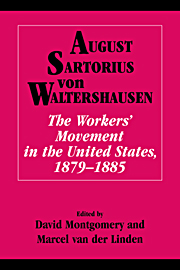Book contents
- Front Matter
- Contents
- Acknowledgments
- 1 Introduction
- 2 August Sartorius von Waltershausen (1852–1938), German Political Economy, and American Labor
- 3 The Trade Unions in the United States of America
- 4 Boycotts: A New Trade Union Weapon in the United States
- 5 Relief Funds in the United States
- 6 Bibliography of Sartorius von Waltershausen's Writings
- Index
1 - Introduction
Published online by Cambridge University Press: 22 September 2009
- Front Matter
- Contents
- Acknowledgments
- 1 Introduction
- 2 August Sartorius von Waltershausen (1852–1938), German Political Economy, and American Labor
- 3 The Trade Unions in the United States of America
- 4 Boycotts: A New Trade Union Weapon in the United States
- 5 Relief Funds in the United States
- 6 Bibliography of Sartorius von Waltershausen's Writings
- Index
Summary
The writings of August Sartorius von Waltershausen provide a rich source for the study of the labor movement in the United States during the 1880s. The author's extensive reproduction of union statutes and his concern for ways in which workers' organizations imposed some order on the chaotic workings of industrial capitalism combine to make these articles both a treasure trove of documentary evidence, much of which is otherwise inaccessible, and a provocative assortment of insights and opinions, some of which differ significantly from the thrust of more recent historical interpretations.
Nevertheless, these articles have scarcely been tapped by historians for more than half a century. Their two most influential uses are to be found in Selig Perlman's account of the labor movement's resurgence after 1879, which was published in 1918, and in the discussion of trade unions on the New Orleans waterfront in Sterling D. Spero and Abram L. Harris, The Black Worker, which was published in 1931. More recently, Gregory R. Zieren and Eric Arnesen have returned to the information and insights offered by Sartorius. Zieren reminded readers of the German economist's pioneering research on American strikes, as well as his assessment of the assimilation of German immigrants.
This neglect cannot be attributed to lack of scholarly interest in the period.On the contrary, the decade of what Perlman called “the Great Upheaval” has attracted considerable attention from historians during the last quarter of a century.
- Type
- Chapter
- Information
- Publisher: Cambridge University PressPrint publication year: 1998
- 1
- Cited by



